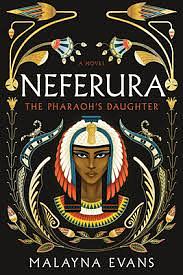Take a photo of a barcode or cover
Plot or Character Driven:
A mix
Loveable characters:
No
Diverse cast of characters:
Yes
slow-paced
Plot or Character Driven:
A mix
Strong character development:
Yes
Loveable characters:
Complicated
Diverse cast of characters:
Yes
Flaws of characters a main focus:
Yes
This piece of historical fiction does an amazing job imagining the life of a royal daughter of ancient Egypt. The real Neferura’s story has been lost to us, but Malayna Evans has crafted a tale full of friendship, love, lies and mystery. I found the balance between historical fact and fiction to be extremely well done, and I think that the use of authentic Egyptian place names to add to the authenticity of the text. The characters were well rounded and intriguing and the plot unfolded beautifully. I highly recommend this book for anyone who likes ancient Egypt and who wants to fill in a little of the mystery that had been left behind.
adventurous
informative
inspiring
medium-paced
adventurous
dark
mysterious
medium-paced
Plot or Character Driven:
A mix
Strong character development:
Complicated
Loveable characters:
Yes
Diverse cast of characters:
Yes
Flaws of characters a main focus:
Yes
adventurous
mysterious
medium-paced
Plot or Character Driven:
A mix
Strong character development:
Yes
Loveable characters:
Complicated
Diverse cast of characters:
Yes
Flaws of characters a main focus:
Yes
Neferura is one of those books that simply worked for me on many different levels: as a reader, a history nerd (especially 2nd Intermediate Period to the early 19th Dynasty), and as an Egyptian. Be warned, this review is essentially me gushing about how it succeeded in captivating me on all these fronts.
As a reader: The story immediately transported me to a world filled with intrigue, drama, politics, backstabbing, and a cast of memorable characters, each with their own agenda. Neferura, the daughter of Pharaoh Hatshepsut and step-sister of Pharaoh Thutmose III, steps out from being a secondary character in others' stories to become the focal point. She navigates through the turbulent times of the power struggle between her mother and step-brother. I found myself rooting for her with every page turned, hoping the next would bring some relief. Her band of friends, each unique and lovable in their own right, adds depth to the narrative. Thutmose, on the other hand, serves as a compelling antagonist, especially how his conflict with Hatshepsut over the throne drags Neferura into a fight she strives to avoid for the sake of her country and its people. Neferura, motivated by duty and a drive to do what is right, becomes the royal I could identify with the most. Watching her grow and learn about the complexity of the world was a delight.
As a history nerd: It was refreshing to see Evans opt for Egyptian names instead of the modern equivalents we use today. This choice lent authenticity to the story, making it easier to immerse myself in Neferura's world. The nods to the Hyksos (or Heka Khasut), whose influence still loomed over the people generations after their defeat, were particularly appreciated. It was intriguing to see the speculations surrounding Hatshepsut’s reign play out in this novel. The behind-the-scenes happenings, royal interactions, noble gossip, and the priesthood's reactions alone would have compelled me to read Neferura. Combining these elements with a well-thought-out plot and incredible characters was a match made in heaven… Duat?… it was divine.
As an Egyptian: I often approach stories about ancient Egypt in Western fiction with caution, as they tend to exoticize Egypt (or Kemet, as it is referred to in Neferura). Not here. Malayna Evans' Neferura is, without a doubt, my favorite depiction of ancient Egypt in fiction. The world felt incredibly authentic, which is not surprising given Evans is an actual Egyptologist. It is evident in her writing that this depiction of ancient Egypt comes from an expert. But more than that, Egypt felt like a real place with real people. Every character had their own life aspirations, societal background, and quirks that made them unique. While the royal family plays a significant role in the story, the heart of the narrative lies with the commoners around Neferura and the traditions that the people earnestly believed in and practiced.
Overall, Neferura was an incredible read that entertained me with its intriguing plot, expansive world, and colorful cast of characters, while also educating me on the finer details of life in 18th Dynasty Egypt. I know this will be a story I'll revisit in the future and my go-to recommendation whenever someone asks about a novel set in ancient Egypt. For that, it gets five glowing stars from me.
As a reader: The story immediately transported me to a world filled with intrigue, drama, politics, backstabbing, and a cast of memorable characters, each with their own agenda. Neferura, the daughter of Pharaoh Hatshepsut and step-sister of Pharaoh Thutmose III, steps out from being a secondary character in others' stories to become the focal point. She navigates through the turbulent times of the power struggle between her mother and step-brother. I found myself rooting for her with every page turned, hoping the next would bring some relief. Her band of friends, each unique and lovable in their own right, adds depth to the narrative. Thutmose, on the other hand, serves as a compelling antagonist, especially how his conflict with Hatshepsut over the throne drags Neferura into a fight she strives to avoid for the sake of her country and its people. Neferura, motivated by duty and a drive to do what is right, becomes the royal I could identify with the most. Watching her grow and learn about the complexity of the world was a delight.
As a history nerd: It was refreshing to see Evans opt for Egyptian names instead of the modern equivalents we use today. This choice lent authenticity to the story, making it easier to immerse myself in Neferura's world. The nods to the Hyksos (or Heka Khasut), whose influence still loomed over the people generations after their defeat, were particularly appreciated. It was intriguing to see the speculations surrounding Hatshepsut’s reign play out in this novel. The behind-the-scenes happenings, royal interactions, noble gossip, and the priesthood's reactions alone would have compelled me to read Neferura. Combining these elements with a well-thought-out plot and incredible characters was a match made in heaven… Duat?… it was divine.
As an Egyptian: I often approach stories about ancient Egypt in Western fiction with caution, as they tend to exoticize Egypt (or Kemet, as it is referred to in Neferura). Not here. Malayna Evans' Neferura is, without a doubt, my favorite depiction of ancient Egypt in fiction. The world felt incredibly authentic, which is not surprising given Evans is an actual Egyptologist. It is evident in her writing that this depiction of ancient Egypt comes from an expert. But more than that, Egypt felt like a real place with real people. Every character had their own life aspirations, societal background, and quirks that made them unique. While the royal family plays a significant role in the story, the heart of the narrative lies with the commoners around Neferura and the traditions that the people earnestly believed in and practiced.
Overall, Neferura was an incredible read that entertained me with its intriguing plot, expansive world, and colorful cast of characters, while also educating me on the finer details of life in 18th Dynasty Egypt. I know this will be a story I'll revisit in the future and my go-to recommendation whenever someone asks about a novel set in ancient Egypt. For that, it gets five glowing stars from me.
emotional
informative
mysterious
medium-paced
Plot or Character Driven:
Plot
Strong character development:
No
Loveable characters:
Complicated
Diverse cast of characters:
Complicated
Flaws of characters a main focus:
No
Even though I‘m really intrigued by egyptian history, I have never read much about it and I certainly don‘t know much. But still, this book sparked my interest with it beautiful cover and blurb.
I loved the narration style and laguage the author used because I could really get lost in the ancient world and feel really present with the characters. The names were unusual but as a fantasy reader I quickly got the hang of all the family and friendship connections.
The one thing that made me put the book down was the pacing, I felt like it was either all happening at once or slowly going forward and the ending felt a bit rushed.
Additionally I did like the author‘s additional background information about her inspiration for Neferura and what the current state of knowlegde and theories about the time and characters are.
Overall this was a great story and I would reconmend it.
I loved the narration style and laguage the author used because I could really get lost in the ancient world and feel really present with the characters. The names were unusual but as a fantasy reader I quickly got the hang of all the family and friendship connections.
The one thing that made me put the book down was the pacing, I felt like it was either all happening at once or slowly going forward and the ending felt a bit rushed.
Additionally I did like the author‘s additional background information about her inspiration for Neferura and what the current state of knowlegde and theories about the time and characters are.
Overall this was a great story and I would reconmend it.
This book did not read like an adult book. The basics of the story held up but that's the most I can say, positively, about it. While the copious gaps in Ancient Egyptian history allow for generous artistic license, Evans fumbles the ball. The spying attempts by the titular character are quite laughable. The plot reads like a poorly executed YA historical fantasy with an incredibly convenient ending.



